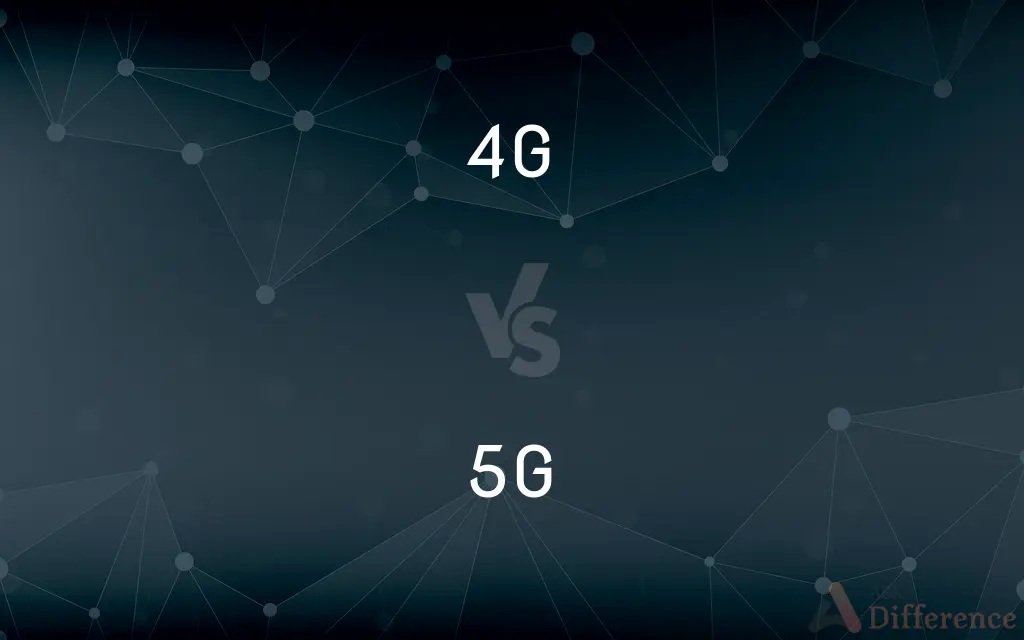4G vs. 5G — What's the Difference?
By Tayyaba Rehman — Published on January 1, 2024
4G is Fourth-generation mobile network technology, offering high-speed internet and data services. 5G is Fifth-generation mobile network technology, providing even faster data speeds, low latency, and support for emerging technologies like IoT.

Difference Between 4G and 5G
Table of Contents
ADVERTISEMENT
Key Differences
4G, or fourth-generation, is a mobile network technology that succeeded 3G. It enables faster internet access and data transmission compared to its predecessor. 4G networks offer improved download and upload speeds, making it suitable for activities like video streaming, online gaming, and browsing. It brought significant advancements in mobile connectivity and paved the way for the digital era we experience today.
5G, or fifth-generation, represents the latest evolution in mobile network technology. It promises even higher data speeds, lower latency, and greater capacity compared to 4G. 5G is designed to support not only smartphones and tablets but also a wide range of connected devices and emerging technologies, including the Internet of Things (IoT), autonomous vehicles, and augmented reality.
The primary difference between 4G and 5G is speed. While 4G provides impressive data speeds, 5G takes it to the next level, offering data rates that are several times faster. This means quicker downloads, smoother streaming, and faster response times when using 5G.
Another key distinction is latency, or the time it takes for data to travel between devices and the network. 5G significantly reduces latency compared to 4G, making it ideal for applications that require real-time communication, such as online gaming and remote surgery.
While 4G has been the backbone of mobile data for years, 5G opens up new possibilities. It empowers innovations like autonomous vehicles, smart cities, and remote healthcare by providing reliable, high-speed connectivity for a multitude of devices simultaneously.
ADVERTISEMENT
Comparison Chart
Speed
Impressive data speeds
Significantly faster data speeds
Latency
Moderate latency
Low latency, ideal for real-time applications
Use Cases
Standard mobile data
IoT, smart cities, autonomous vehicles
Compare with Definitions
4G
4G is fourth-generation mobile network technology.
4G networks enable fast internet on smartphones.
5G
5G is fifth-generation mobile network technology.
5G networks offer blazing-fast internet.
4G
4G is the predecessor of 5G technology.
Most older smartphones use 4G networks.
5G
5G offers low latency for real-time tasks.
5G is ideal for online gaming without lag.
4G
4G offers improved download and upload speeds.
Streaming HD videos is smooth with 4G.
5G
5G drives innovations like autonomous vehicles.
5G networks power self-driving cars.
4G
4G facilitates online gaming and video calls.
4G connectivity enhances multiplayer gaming.
5G
5G provides ultra-fast data speeds.
Downloading large files is quick with 5G.
4G
4G revolutionized mobile data transmission.
4G networks made mobile browsing faster.
5G
5G enables IoT and smart city applications.
5G supports a network of connected devices.
Common Curiosities
Can I use 4G devices on a 5G network?
Yes, 4G devices can connect to 5G networks, but they won't experience the full benefits of 5G.
What is 4G technology primarily known for?
4G is known for providing high-speed mobile internet and data services.
How does 5G differ from 4G in terms of speed?
5G offers significantly faster data speeds compared to 4G, making downloads and streaming even quicker.
What are some of the use cases that 5G technology enables?
5G enables IoT, smart cities, autonomous vehicles, augmented reality, and other emerging technologies.
What is latency, and why is it important in mobile networks?
Latency is the time it takes for data to travel. Lower latency in 5G means faster response times for applications like online gaming and real-time communication.
Is 4G still relevant with the introduction of 5G?
Yes, 4G continues to be relevant and widely used, especially in areas where 5G coverage is limited.
Is 5G available worldwide, or is it still being rolled out?
5G is gradually being deployed in various regions, so its availability varies by location.
What role does 4G play in regions with limited 5G coverage?
4G continues to provide reliable mobile data services in areas where 5G is not yet available.
Is 5G technology backward compatible with older network generations?
Yes, 5G networks are designed to coexist with 4G and earlier technologies, ensuring compatibility.
Can 4G networks handle the data demands of streaming 4K videos?
Yes, 4G networks can support 4K video streaming, but 5G offers even better performance for such tasks.
What are the advantages of 5G for IoT applications?
5G provides the capacity and low latency required for connecting a vast number of IoT devices and enabling real-time data processing.
How does 4G compare to 5G in terms of supporting online gaming?
5G offers lower latency, providing a smoother gaming experience compared to 4G.
Do I need to upgrade my smartphone to use 5G?
Yes, you'll need a 5G-compatible device to access 5G networks fully.
What are the benefits of 5G for autonomous vehicles?
5G enables faster communication between autonomous vehicles and infrastructure, enhancing safety and coordination.
Can 4G and 5G networks work together in a single network infrastructure?
Yes, many network operators use a combination of 4G and 5G technologies to ensure comprehensive coverage and seamless transitions.
Share Your Discovery

Previous Comparison
Sunmica vs. Laminate
Next Comparison
Personal Unconscious vs. Collective UnconsciousAuthor Spotlight
Written by
Tayyaba RehmanTayyaba Rehman is a distinguished writer, currently serving as a primary contributor to askdifference.com. As a researcher in semantics and etymology, Tayyaba's passion for the complexity of languages and their distinctions has found a perfect home on the platform. Tayyaba delves into the intricacies of language, distinguishing between commonly confused words and phrases, thereby providing clarity for readers worldwide.














































